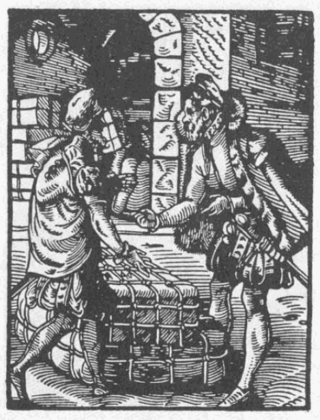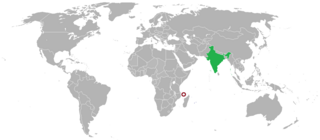
In the culinary arts, a spice is any seed, fruit, root, bark, or other plant substance in a form primarily used for flavoring or coloring food. Spices are distinguished from herbs, which are the leaves, flowers, or stems of plants used for flavoring or as a garnish. Spices are sometimes used in medicine, religious rituals, cosmetics, or perfume production. They are usually classified into spices, spice seeds, and herbal categories.For example, vanilla is commonly used as an ingredient in fragrance manufacturing. Plant-based sweeteners such as sugar are not considered spices.

Trade involves the transfer of goods and services from one person or entity to another, often in exchange for money. Economists refer to a system or network that allows trade as a market.

The United East India Company, commonly known as the Dutch East India Company, was a chartered trading company and one of the first joint-stock companies in the world. Established on 20 March 1602 by the States General of the Netherlands amalgamating existing companies, it was granted a 21-year monopoly to carry out trade activities in Asia. Shares in the company could be purchased by any citizen of the United Provinces and then subsequently bought and sold in open-air secondary markets. The company possessed quasi-governmental powers, including the ability to wage war, imprison and execute convicts, negotiate treaties, strike its own coins, and establish colonies. Also, because it traded across multiple colonies and countries from both the East and the West, the VOC is sometimes considered to have been the world's first multinational corporation.

The Scoville scale is a measurement of pungency of chili peppers and other substances, recorded in Scoville heat units (SHU). It is based on the concentration of capsaicinoids, among which capsaicin is the predominant component.

Fair trade is a term for an arrangement designed to help producers in developing countries achieve sustainable and equitable trade relationships. The fair trade movement combines the payment of higher prices to exporters with improved social and environmental standards. The movement focuses in particular on commodities, or products that are typically exported from developing countries to developed countries but is also used in domestic markets, most notably for handicrafts, coffee, cocoa, wine, sugar, fruit, flowers and gold.

Cardamom, sometimes cardamon or cardamum, is a spice made from the seeds of several plants in the genera Elettaria and Amomum in the family Zingiberaceae. Both genera are native to the Indian subcontinent and Indonesia. They are recognized by their small seed pods: triangular in cross-section and spindle-shaped, with a thin, papery outer shell and small, black seeds; Elettaria pods are light green and smaller, while Amomum pods are larger and dark brown.

Non-tariff barriers to trade are trade barriers that restrict imports or exports of goods or services through mechanisms other than the simple imposition of tariffs. Such barriers are subject to controversy and debate, as they may comply with international rules on trade yet serve protectionist purposes.
Hardy Spicer is a brand of automotive transmission or driveline equipment best known for its mechanical constant velocity universal joint originally manufactured in Britain by Hardy employing patents belonging to US-based Spicer Manufacturing. Hardy and Spicer soon became partners. Later Spicer became Dana Holding Corporation.

Lead(II) chromate is an inorganic compound with the chemical formula PbCrO4. It has a vivid yellow color and is generally insoluble. Two polymorphs of lead chromate are known, orthorhombic and the more stable monoclinic form. Monoclinic lead chromate is used in paints under the name chrome yellow, and many other names. It occurs also as the mineral crocoite.
The Society of Motor Manufacturers and Traders (SMMT) is the trade association for the United Kingdom motor industry. Its role is to "promote the interests of the UK automotive industry at home and abroad."
American Society of Travel Advisors is a trade association which was formed to represent and defend the business and regulatory public policy interests of travel intermediaries, including travel agencies and tour providers. The headquarters of the American Society of Travel Advisors is in Alexandria, Virginia, United States; it is a US Internal Revenue Service 501(c)(6) tax-exempt not-for-profit entity.

The American Society of Appraisers (ASA) is an American nonprofit organization which serves as a professional affiliation of appraisers. The organization is a multi-discipline, voluntary membership, trade association representing and promoting their member appraisers.

Technical barriers to trade (TBTs), a category of nontariff barriers to trade, are the widely divergent measures that countries use to regulate markets, protect their consumers, or preserve their natural resources, but they also can be used to discriminate against imports in order to protect domestic industries.
The textile industry in India, traditionally after agriculture, is the only industry in the country that has generated large-scale employment for both skilled and unskilled labour. The textile industry continues to be the second-largest employment generating sector in India. It offers direct employment to over 35 million people in the country. India is the world's second largest exporter of textiles and clothing, and in the fiscal year 2022, the exports stood at US$ 44.4 billion. According to the Ministry of Textiles, the share of textiles in total exports during April–July 2010 was 11.04%. During 2009–2010, the Indian textile industry was pegged at US$55 billion, 64% of which services domestic demand. In 2010, there were 2,500 textile weaving factories and 4,135 textile finishing factories in all of India. According to AT Kearney’s ‘Retail Apparel Index’, India was ranked as the fourth most promising market for apparel retailers in 2009.
Founded in 1883, the American Seed Trade Association (ASTA) is one of the oldest trade organizations in the United States. Its membership consists of over 700 companies involved in seed production and distribution, plant breeding, and related industries in North America. As an authority on plant germplasm, ASTA advocates science and policy issues related to the development, marketing and movement of seed, associated products and services throughout the world.

The International Scouting Collectors Association (ISCA) was established in 2001 as a non-profit group interested in furthering the education of scouting through the trade and display of memorabilia and history of the BSA and Scouting. The ISCA states that [their] "primary purpose is to educate the membership and others regarding Scouting memorabilia and promotion of the ISCA Ethics."

Comoros–India relations are the international relations that exist between Comoros and India. The Embassy of India in Antananarivo, Madagascar is concurrently accredited to Comoros. India also maintains an Honorary Consulate General in Moroni. Comoros maintains an Honorary Consulate in New Delhi.
Burlap & Barrel is an American spice importer that sources sustainable, single-origin spices directly from farmers and foragers. It is a public benefit corporation.

Kashmiri Red Chilies or Kashmiri Laal Mirch are characterized by their ability to give a dark red colour to food, capable of colouring and adding flavour, while at the same time not allowing the food to become too pungent or spicy.











